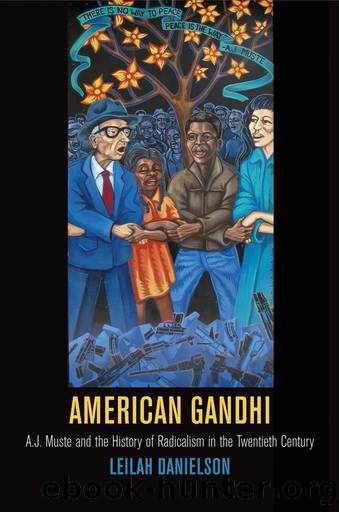American Gandhi: A. J. Muste and the History of Radicalism in the Twentieth Century by Leilah Danielson

Author:Leilah Danielson [Danielson, Leilah]
Language: eng
Format: epub
Tags: Historical, Biography, United States, Biography & Autobiography, 20th Century, Political Science, History, Political, General
ISBN: 9780812246391
Google: Dh86BAAAQBAJ
Goodreads: 22260009
Publisher: University of Pennsylvania Press
Published: 2014-09-25T00:00:00+00:00
FIGURE 7. Dave Dellinger, Bayard Rustin, Winifred Rawlins, and A. J. Muste discuss the ââFast for Peace,ââ held in Washington, D.C., Easter 1950. (Swarthmore College Peace Collection)
Muste was deeply ambivalent about the tendency of many Peacemakers to separate from the mainstream, particularly in rural settings. With his urban, working-class background, he could not help but think that many community experiments were really just ââoutlets for certain types of intellectuals and disoriented middle-class people which are therefore inherently incapable of expansion beyond very narrow limits.ââ97 These differences did not assume much importance in the immediate postwar period; as a whole, they retained a strong social purpose, viewing their communities as the ââgrowing edgeââ in the âânon-violent revolutionââ and continuing their protest activities on behalf of world peace and racial equality. But around 1950, with the development of the hydrogen bomb, the deepening of the Cold War, and the emergence of a full-fledged Red Scare, Peacemakers began to despair of ever changing American opinion and increasingly turned inward, focusing on realizing their goals of egalitarianism and fellowship within their own communities. As a result, members faded away, dropping from probably around three thousand persons in 1948 to several hundred in 1952. Indeed, radical pacifism seemed increasingly a marker of identity rather than a reference to an actual revolutionary program; they judged American society harshly and sometimes withdrew from it, or else they used nonviolent direct action to create reform, not revolution.98
The growing quietism of his comrades deeply disturbed Muste. He recognized that the intense nationalism and the relative affluence of American society made it now highly unlikely that Americans would recognize their special burden and responsibility for ending the arms race. At the same time, however, he viewed the turn inward as an expression of despair and urged his comrades to remain political. In particular, after meeting with Gandhians at the 1949 World Pacifist Meeting in India, he became increasingly intrigued by the idea of building a ââthird campââ of unaligned elements and nations. While the context of the intense power struggle between the United States and the Soviet Union made such a movement unlikely, he proposed that the Peacemakers endorse it as a way of remaining dynamic and engaged.99
With the appearance of the South African Campaign for the Defiance of Unjust Laws in 1952, he also began to consider the possibility that nonviolence might have a role to play in African liberation movements. No doubt encouraging him in this view was a letter from Gandhiâs son, Manilal, who observed that ââFatherâs spirit seems to be watching over and guiding them.ââ100 Yet the group, already scattered and decimated by the hostile, conservative climate of the early Cold War, divided on the question and refused to give it their unequivocal support. Muste remained magnanimous in his defeat. While warning pacifists to be wary of retreating into havens in a corrupt world, he reflected that sainthood still had its purpose: ââeven if we are destined in our lifetime to be a tiny and harassed
Download
This site does not store any files on its server. We only index and link to content provided by other sites. Please contact the content providers to delete copyright contents if any and email us, we'll remove relevant links or contents immediately.
| Chakras | Gandhi |
| History | Rituals & Practice |
| Sacred Writings | Sutras |
| Theology |
Fingersmith by Sarah Waters(2536)
Kundalini by Gopi Krishna(2180)
Wheels of Life by Anodea Judith(2146)
Indian Mythology by Devdutt Pattanaik(1937)
The Bhagavad Gita by Bibek Debroy(1929)
The Yoga of Jesus: Understanding the Hidden Teachings of the Gospels by Paramahansa Yogananda(1861)
Autobiography of a Yogi (Complete Edition) by Yogananda Paramahansa(1825)
The Man from the Egg by Sudha Murty(1812)
The Book of Secrets: 112 Meditations to Discover the Mystery Within by Osho(1675)
Chakra Mantra Magick by Kadmon Baal(1638)
The Sparsholt Affair by Alan Hollinghurst(1585)
Sparks of Divinity by B. K. S. Iyengar(1532)
Gandhi by Ramachandra Guha(1528)
Avatar of Night by Tal Brooke(1521)
Karma-Yoga and Bhakti-Yoga by Swami Vivekananda(1492)
The Bhagavad Gita (Classics of Indian Spirituality) by Eknath Easwaran(1488)
The Spiritual Teaching of Ramana Maharshi by Ramana Maharshi(1432)
Hindoo Holiday by J. R. Ackerley(1378)
Hinduism: A Very Short Introduction (Very Short Introductions) by Knott Kim(1374)
